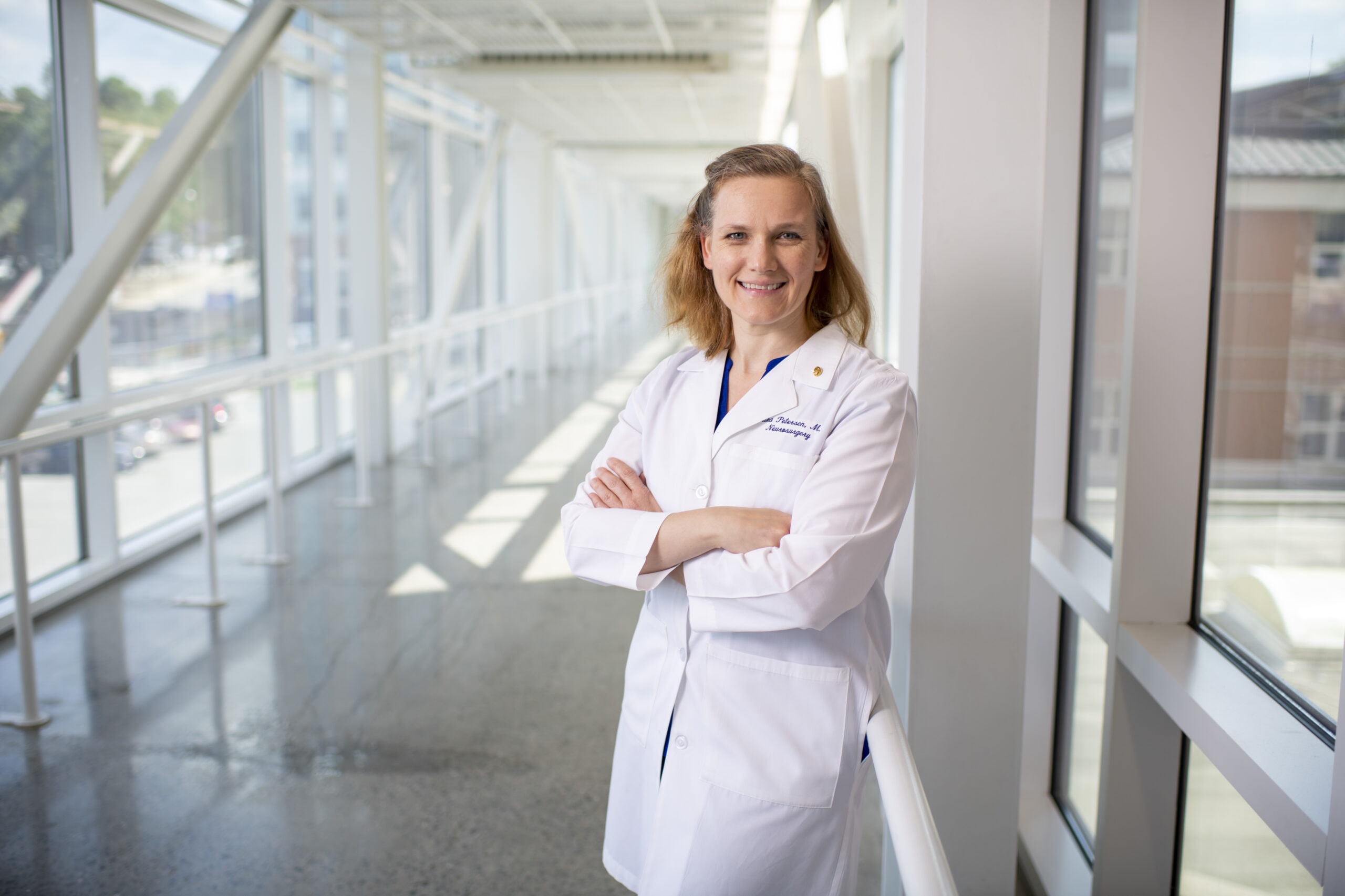UAMS Neurosurgeon’s Study on Breakthrough Treatment for Painful Diabetic Neuropathy Published in Diabetes Care
| Results of a 12-month multicenter randomized clinical trial led by Erika Petersen, M.D., a professor of neurosurgery at the University of Arkansas for Medical Sciences (UAMS), were published online Nov. 29 in Diabetes Care, highlighting the benefits of a breakthrough treatment for patients with painful diabetic neuropathy (PDN).
Petersen, director of Functional and Restorative Neurosurgery at UAMS, was the lead investigator in the study that involved 216 patients at 18 centers in the United States. Johnathan Goree, M.D., an associate professor in the UAMS Department of Anesthesiology and director of the Chronic Pain Division, is a co-investigator on the study.
The study, for which UAMS began enrolling participants in 2018, examined results of high-frequency spinal cord stimulation therapy for patients with PDN, a chronic neurological condition that manifests as burning, excruciating, stabbing or intractable pain, or tingling or numbness. Specifically, the study compared the 10 kHz treatment plus conventional medical management to results of the conventional treatment alone, and found that the high-frequency therapy results in significant pain relief and neurological improvements in patients with persistent PDN.
“Patients with painful diabetic neuropathy have no way to cure their condition, and many have trouble achieving relief from their pain,” Petersen said. “However, with high-frequency 10 kHz SCS, I’m seeing durable pain relief and potentially disease-modifying neurological improvements, which could be a game-changer when it comes to how we treat patients with impaired sensory function related to diabetic neuropathy.”
Durable pain relief means patients demonstrated pain reduction of 50% or more, which was maintained for 12 months. The trial follows patients for 24 months.
Nevro Corp., a global medical device company based in California that created the Senza spinal cord stimulation system that delivers the 10 kHz therapy, touted the findings of the landmark clinical trial, which was supported by the UAMS Translational Research Institute.
“No conventional, low-frequency SCS treatments have demonstrated such positive results in treating PDN patients,” said D. Keith Grossman, chairman, chief executive officer and president of Nevro.
Nevro’s system, called HFX, is the only SCS system approved by the FDA with a specific indication for painful diabetic neuropathy.
The high-frequency spinal stimulation is delivered through two thin, insulated wires inserted into the back, near the spinal cord, in a minimally invasive outpatient procedure. The wires are attached to a small implanted device that recharges wirelessly through the skin. The wires deliver mild electrical impulses directly to a processing center in the spinal cord, suppressing neural hyperactivity and reducing pain signals to the brain.
The method stimulates the inhibitory neurons without stimulating the excitatory neurons, reducing pain without paresthesia, a tingling sensation that can occur during traditional spinal cold stimulation.
The World Health Organization estimates there are 422 million adults with diabetes worldwide. About 20% of patients with diabetes will develop PDN, a progressive, potentially debilitating chronic neuropathic pain condition.
UAMS is the state’s only health sciences university, with colleges of Medicine, Nursing, Pharmacy, Health Professions and Public Health; a graduate school; a hospital; a main campus in Little Rock; a Northwest Arkansas regional campus in Fayetteville; a statewide network of regional campuses; and eight institutes: the Winthrop P. Rockefeller Cancer Institute, Jackson T. Stephens Spine & Neurosciences Institute, Harvey & Bernice Jones Eye Institute, Psychiatric Research Institute, Donald W. Reynolds Institute on Aging, Translational Research Institute, Institute for Digital Health & Innovation and the Institute for Community Health Innovation. UAMS includes UAMS Health, a statewide health system that encompasses all of UAMS’ clinical enterprise. UAMS is the only adult Level 1 trauma center in the state. UAMS has 3,485 students, 915 medical residents and fellows, and seven dental residents. It is the state’s largest public employer with more than 11,000 employees, including 1,200 physicians who provide care to patients at UAMS, its regional campuses, Arkansas Children’s, the VA Medical Center and Baptist Health. Visit www.uams.edu or uamshealth.com. Find us on Facebook, X (formerly Twitter), YouTube or Instagram.###
